The Complete Guide to Becoming a Product Manager
Being a product manager means being a visionary, from strategic to tactical activities. One must have knowledge of business, marketing, data analysis, and technology, while also having strong leadership, communication, and organizational skills.
While this position is only about 20 years old, it has become an increasingly integral role in organizations and has a very positive outlook for the future. The overarching objective of product management is to guarantee that the product supports the organization’s general goals and strategies.
What is a Product Manager?
A product manager resides at the nexus of business, user experience, and technology. One must find an equilibrium between these three disciplines to make difficult decisions and trade-offs. Furthermore, a product manager is responsible for setting goals, defining success metrics, keeping various teams and departments motivated, and is responsible for the prevailing outcome and performance of a product.
The exact duties of a product manager differ, with the main variable being the size of the organization. At larger organizations, a product manager collaborates within a larger team of specialists, such as researchers, analysists, and marketing professionals to gather input and information, while developers and designers manage daily operations, such as blueprinting designs, testing prototypes, and finding potential issues in the product. In smaller organizations, product managers focus their time more on the hands-on work that comes with defining a vision that aligns with the organization’s identity and objectives and seeing it through to fruition.
An effective product manager will devote their time to:
- Comprehending and advocating for user and customer needs and wants
- Constantly monitoring the market and developing analyses to remain competitive
- Defining the overarching vision for a product and ensuring that it aligns with the organization’s identity, strategy, and objectives
- Continually communicating with stakeholders to ensure agreement about the vision for a product
- Highlighting and prioritizing product features and competence
- Facilitating a shared vision across a larger team to empower individuals to innovate and independently make decisions
Why Become a Product Manager?
The product manager’s job description is quite complex and difficult but can be extremely gratifying. A combination of empathy and communication, dedication and learning rapidly, and ruthless prioritization are necessary to become a successful product manager.
So, why become a product manager?
Create genius ideas
As a product manager, you create that necessary spark that leads to new and innovative products. As the creator, leader, and moderator of the preliminary stages, you have much creative freedom.
Drive strategy
Every decision from the beginning, middle, and end stages of the product process must pass through you. You have a 360-degree perspective of each product, and ultimately drive the strategic objectives of the organization.
Create a shared vision and common goal
You must be a people person with the ability to unite and create a shared vision amongst your team. This means you have the opportunity to construct a team of passionate and diligent team players. By creating a highly coordinated team, you optimize space for innovation and collaboration, while minimizing the potential for conflicts.
Inspire, influence, and innovate
Through your team recruitment, you have the ability to create a profound impact on each and every member of the team. Your positive and entrepreneurial attitude is infectious, and you can create a culture of enthusiasm, passion, and continuous innovation. Not only do you have an immense influence over the products, but also over the people making them. By inspiring your team to go above and beyond, you can lead your organization into unfounded territory.
Work on products from start to finish
While many individuals in an organization work only with one specific aspect of the supply chain, you have a complete overview, from the ideation and innovation stage to rollout and direct communication with users and consumers. While this does mean added pressure, it also means an exceptionally gratifying payoff.
Thrill of solving complex problems
This means perceiving obstacles before you run into them, making the right decision at the right time, and constantly thinking on your feet. Having such a profound and positive impact on your organization is one of the primary reasons people decide to become product managers.
How Do You Become a Product Manager?
While there are no formal qualifications to become a product manager, experience in the field is a must. Due to the high level of responsibility, it is recommended to have commercial success, knowledge of marketing, IT, and user experience.
A degree in engineering, product design, computer science, or the specific industry is highly valued. Additionally, previous experience in software, web development, and product development in a nonmanagerial role is a usual qualification. Furthermore, it is recommended to have demonstratable knowledge of search engine marketing (SEM) and online advertising.
Strong experience in a dynamic product management role
This role is exceedingly multifaceted. You should be able to translate product strategy into detailed requirements for prototyping and finalizing product development by engineering teams. Additionally, you must create product strategy documents that describe business cases, high-level use cases, technical requirements, revenue, and ROI. These skills and tactics are primarily learned through experience.
Proven success in overseeing all elements of the product development lifecycle
As you will drive the execution of all processes in the product lifecycle, including product and market research, competitor analysis, planning, positioning, requirements and roadmap development, and product launch, comprehension of the product lifecycle is a necessity.
High effectiveness in managing cross-functional teams
You must be able to collaborate closely with a multitude of members from a multitude of departments, including engineering, sales, production, and marketing to drive the product and business planning for cross-functional teams.
Experience in delivering finely tuned product marketing strategies
You should be able to analyze market data to develop marketing and sales strategies, as well as define product objectives for effective and efficient marketing communications. Furthermore, you must develop product positioning and strategy to create a message that differentiates your organization from the rest in primary market segments.
Exceptional writing, editing, presentation, and public speaking skills
As with all C-suite positions, it is a necessity to communicate clearly, concisely, and confidently. As a transversal role, you must communicate not only internally with practically all the departments, but also with customers and users.
This requires strong written and verbal communication. Furthermore, you will be expected to give presentations explaining your strategies, designs, and projections to multiple teams and departments.
Professional Certificate Program in Product Management at MIT Professional Education
An all-encompassing certificate program in Product Management certainly assists professionals achieve their career goals. MIT Professional Education offers a 9-month online Professional Certificate Program in Product Management to help professionals hone their skills and become successful product managers.
In the comprehensive learning journey, you will acquire both tactical and strategic knowledge and develop the holistic perspective of product management to take your career to unprecedented heights. You will become part of the MIT community, the leading institution in the world for innovation and technology.
After successful completion, the Professional Certificate Program in Product Management will award you certificates in the following courses:
- Designing Product Families: From Strategy to Implementation
- Digital Platforms: Designing: Designing Two-Sided Markets from APIs to Feature Roadmaps
- Designing High Impact Solutions with MITdesignX
- Elective course
You will network with professionals from all over the world and dig deeper from industry experts including Dr. Bruce Cameron, Prof. Svafa Grönfeldt, and Gilad Rosenzweig all instructors at MIT Professional Education. Find out more about our programs at MIT Professional Education. Learn from MIT experts and accelerate your career.

Clara Piloto
Director of Global Programs, Director of Digital Plus Programs
MIT Professional Education
Massachusetts Institute of Technology
professional.mit.edu
